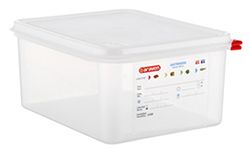2. Recycle

It will be impossible to stamp out all waste in a commercial kitchen, but you can help reduce waste ending up in landfill and hanging around for years to come by choosing recyclable or biodegradable options, where possible.
For example, if you serve takeout food, consider using biodegradable disposable items such as compostable cutlery, take out cartons, cups and straws instead of the standard plastic or foam options.
Single-use plastic straws are also commonly used in commercial kitchens, but their reputation for contributing to waste is scandalous. It's estimated that at least 4.4 billion straws are thrown away in the UK every year, many of which end up in our oceans. To help reduce the waste problem linked to straws, using biodegradable, paper or compostable straws makes perfect sense.
It's also a worthwhile idea to train staff to get into the habit of recycling as much waste as possible in the kitchen. Have separate bins for recycled waste, such as cans, bottles and paper, and place a bin outdoors for kitchen peelings that can be used to make garden compost. The compost can be given away or even a great extra source of income for a smaller business.





